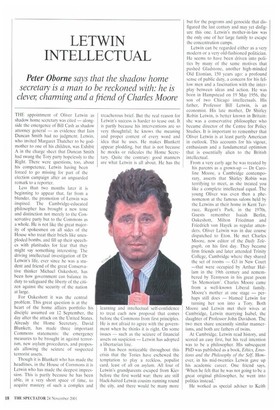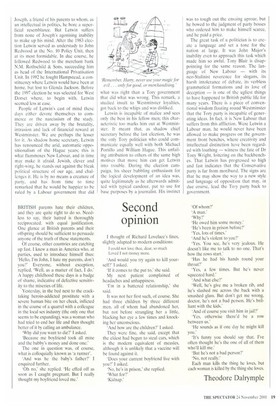LET WIN INTELLECTUAL
Peter °borne says that the shadow home
secretag is a man to be reckoned with: he is clevel; charming and a friend of Charles Moore
THE appointment of Oliver Letwin as shadow home secretary was cited — alongside the emergence of Bill Cash as shadow attorney general — as evidence that lain Duncan Smith had no judgment. Letwin. who invited Margaret Thatcher to be godmother to one of his children, was Exhibit A in the charge sheet that Duncan Smith had swung the Tory party hopelessly to the Right. There were questions, too, about his competence, Letwin having been forced to go missing for part of the election campaign after an unguarded remark to a reporter.
Less than two months later it is beginning to appear that, far from a blunder, the promotion of Letwin was inspired. The Cambridge-educated philosopher has brought a new tone and distinction not merely to the Conservative party but to the Commons as a whole. He is not like the great major ity of spokesmen on all sides of the House who treat their briefs like unexploded bombs, and fill up their speech es with platitudes for fear that they might say something interesting. The driving intellectual investigation of Dr Letwin's life, ever since he was a student and friend of the great Conservative thinker Michael Oakeshott, has been how government can balance its duty to safeguard the liberty of the citizen against the security of the nation at large.
For Oakeshott it was the central problem. This great question is at the heart of the home affairs portfolio his disciple assumed on 12 September, the day after the attack on the United States. Already the Home Secretary, David Blunkett, has made three important Commons statements: the emergency measures to be brought in against terrorism, new asylum procedures, and proposals allowing the seizure of suspected terrorist assets.
Though it is Blunkett who has made the headlines, in the House of Commons it is Letwin who has made the deepest impression. This is partly because he has been able, in a very short space of time, to acquire mastery of such a complex and treacherous brief. But the real reason for Letwin's success is harder to tease out. It is partly because his interventions are so very thoughtful: he knows the meaning and proper context of every word and idea that he uses. He makes Blunkett appear plodding, but that is not because he mocks or ridicules the Home Secretary. Quite the contrary: good manners are what Letwin is all about. He has the learning and intellectual self-confidence to treat each new proposal that comes before the Commons from first principles. He is not afraid to agree with the government when he thinks it is right. On some issues — such as the seizure of financial assets on suspicion — Letwin has adopted a libertarian line.
It has been noticeable throughout this crisis that the Tories have eschewed the temptation to play a reckless, populist card, least of all on asylum. All four of Letwin's grandparents escaped from Kiev before the first world war: there are still black-haired Letwin cousins running round the city, and there would be many more hut for the pogroms and genocide that disfigured the last century and may yet disfigure this one. Letwin's mother-in-law was the only one of her large family to escape the concentration camps.
Letwin can be regarded either as a very modern or a very old-fashioned politician. He seems to have been driven into politics by many of the same motives that pushed Gladstone, another high-minded Old Etonian, 150 years ago: a profound sense of public duty, a concern for his fellow men and a fascination with the interplay between ideas and action. He was born in Hampstead on 19 May 1956, the son of two Chicago intellectuals. His father, Professor Bill Letwin, is an economist. His late mother, Dr Shirley Robin Letwin, is better known in Britain: she was a conservative philosopher who became director of the Centre for Policy Studies. It is important to remember that Oliver Letwin is at least partly American in outlook. This accounts for his vigour, enthusiasm and a fundamental optimism that is essentially alien to the British intellectual.
From a very early age he was treated by his parents as a grown-up — Dr Caroline Moore, a Cambridge contemporary, asserts that Shirley Robin was terrifying to meet, as she treated you like a complete intellectual equal. The young Oliver was even then a phenomenon at the famous salons held by the Letwins at their home in Kent Terrace, Regent's Park, in the 1970s. Guests remember Isaiah Berlin, Oakeshott, Milton Friedman and Friedrich von Hayek as regular attenders. Oliver Letwin was in due course dispatched to Eton. He met Charles Moore, now editor of the Daily Telegraph, on his first day. They became firm friends and later attended Trinity College, Cambridge where they shared the set of rooms — G3 in New Court —that were occupied by Arthur Hallam in the 19th century and remembered by Tennyson in his great poem 'In Memoriam'. Charles Moore came from a well-known Liberal family. Moore's mother at one stage — perhaps still does — blamed Letwin for turning her son into a Tory. Both
Moore and Letwin met their wives at Cambridge, Letwin marrying Isabel, the daughter of Professor John Davidson. The two men share uncannily similar manner isms, and both are fathers of twins.
At Cambridge. Letwin read history, and scored an easy first, but his real intention was to be a philosopher. His subsequent PhD was published as a book, Ethics, Emotions and the Philosophy of the Self. However, in his mid-twenties Letwin gave up his academic career. One friend says, 'When he felt that he was not going to be a great original philosopher, he went into politics instead.'
He worked as special adviser to Keith Joseph. a friend of his parents to whom, as an intellectual in politics, he bore a superficial resemblance. But Letwin suffers from none of Joseph's agonising inability to make up his mind. After the 1983 election Letwin served as understudy to John Redwood at the No. 10 Policy Unit, then at its most formidable. In due course, he followed Redwood to the merchant bank N.M. Rothschild & Sons, succeeding him as head of the International Privatisation Unit. In 1992 he fought Hampstead, a constituency where Letwin would have been at home, but lost to Glenda Jackson. Before the 1997 election he was selected for West Dorset where, to begin with, Letwin seemed less at ease.
People of Letwin's cast of mind these days either devote themselves to commerce or the narcissism of the study. They are driven away by the brutality, intrusion and lack of financial reward at Westminster. We are perhaps the lesser for it. As shadow home secretary, Letwin has renounced the arid, automatic oppositionalism of the Hague years; this is what flummoxes New Labour, and in time may make it afraid. Jewish, clever and right-wing, he stands out against the bleak political structure of our age, and challenges it. He is by no means a creature of party, and has from time to time remarked that he would be happier to be ruled by a Labour government that did what was right than a Tory government that did what was wrong. This remark, a studied insult to Westminster loyalties, got back to the whips and was disliked.
Letwin is incapable of malice and sees only the best in his fellow men; this characteristic too marks him out at Westminster. It meant that, as shadow chief secretary before the last election, he was the only Tory politician who could communicate equally well with both Michael Portillo and William Hague. This unfailing attribution to others of the same high motives that move him can get Letwin into trouble. During the election campaign, his sheer bubbling enthusiasm for the logical development of an idea was, quite legitimately as he afterwards admitted with typical candour, put to use for base purposes by a journalist. His instinct
was to tough out the ensuing uproar, but he bowed to the judgment of party bosses who ordered him to make himself scarce, and he paid a price.
The great task of a politician is to create a language and set a tone for the nation at large. It was John Major's inability even to approach this task which made him so awful. Tony Blair is disappointing for the same reason. The language of New Labour — with its neo-Stalinist reverence for slogans, its harsh intolerance of debate, its verbless grammatical formations and its love of deception — is one of the ugliest things to have happened to British public life for many years. There is a piece of conventional wisdom floating round Westminster that the Tory party is incapable of generating ideas. In fact, it is New Labour that suffers from this affliction. Were Letwin a Labour man, he would never have been allowed to make progress on the government front benches, where creativity and intellectual distinction have been regarded with loathing — witness the fate of Dr Tony Wright, loitering on the backbenches. That Letwin has progressed so high and fast indicates that the Conservative party is far from moribund. The signs are that he may show the way to a new style and language of opposition that may, in due course, lead the Tory party back to government.



















































































 Previous page
Previous page